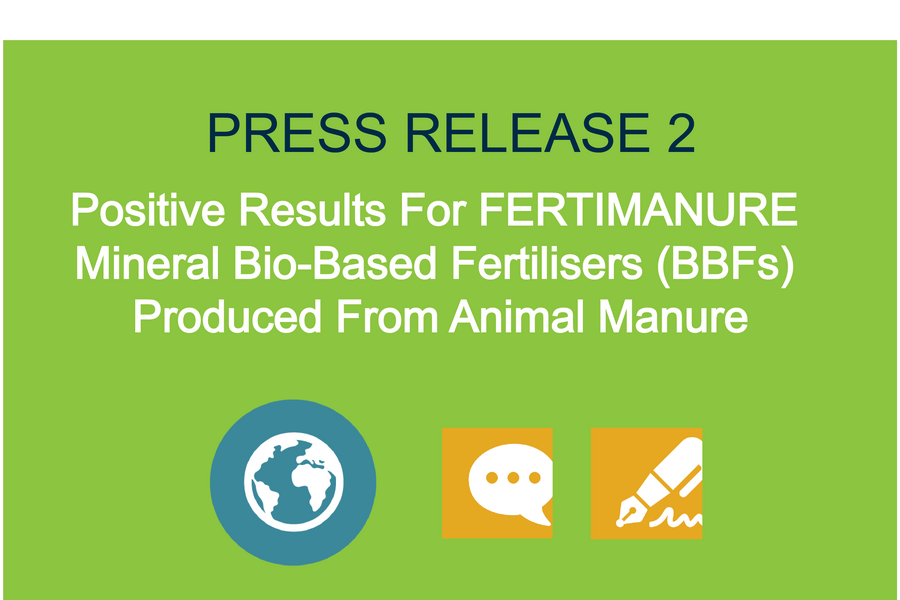

Positive Results For FERTIMANURE Mineral Bio-Based Fertilisers (BBFs) Produced From Animal Manure
11 September 2023
FERTIMANURE is an innovative project that is developing, integrating, testing, and validating novel Nutrient Management Strategies to efficiently recover nutrients and other relevant products with agronomic value from animal manure.
In the past, the production of mineral fertilisers from rock deposits (P) and based on fossil energy (N) has enabled food security and access to sufficient food for the World’s growing global population. Nonetheless, the EIP-Agri has emphasised that the current dependency of EU agriculture on fossil-based mineral fertilisers must be regarded as a very serious threat to future food security.
The five FERTIMANURE experimental pilots Five experimental pilot plants were set up to obtain reliable and safe Bio-Based Fertilisers (BBFs) in European countries most relevant in terms of livestock production.
Pilot locations:
Together these pilot plants have produced 18 BBFs from pig slurry, poultry manure, and cattle slurry and manure. All have been fully characterised and agronomically tested.
These 18 BBFs can be divided into the following categories:
The results obtained with ammonium sulphate (mineral BBF)
Within the FERTIMANURE project, ammonium sulphate is produced in four out of the five pilots (The Netherlands, Belgium, France, and Spain). Two different technological approaches are used to recover this mineral fertiliser. On the one hand, ammonium sulphate is produced by stripping ammonia (i.e. forcing ammonia volatilisation from liquid to gas phase) from nitrogen-rich biomass streams such as the liquid fraction (LF) of manure, digestate or the LF of digestate, and scrubbing ammonia in the off-gas (i.e. capturing the ammonia from the off-gas into an acid solution). On the other hand, selective ammonia separation through Liquid-Liquid membrane contactors has also been demonstrated.
The characterisation of the ammonium sulphates produced in the FERTIMANURE pilots have shown a N content of between 2 and 7%, and their chemical composition is in line with the requirements established by the EU Fertilising Products Regulation (Regulation EU 2019/1009). In 2021, the agronomic performance of ammonium sulphate was tested in 10 field trial locations across France, Belgium, and the Netherlands, and in 4 pot trials across the aforementioned countries. Maize, grass, potatoes, cabbage, sugar beet, and spinach were the 6 different types of crops used in the field and pot trials. Agronomic results have shown that at a given level of nitrogen fertilisation there were no significant differences observed in terms of the crop yield between the FERTIMANURE ammonium sulphate solutions and the synthetic nitrogen fertiliser references.
In regard to the recommendations for practical use or future steps needed, it can be stated that ammonium sulphate has the potential to be used as a replacement for synthetic nitrogen fertilisers. Moreover, most of the FERTIMANURE ammonium sulphates could be recognised in the EU Fertiliser Market as “Straight liquid inorganic macronutrient fertiliser (PFC 1(C))”. However, the main remaining challenge is the low nitrogen content (< 10%) compared to synthetic counterparts, hence the need for larger volumes of the product needing to be applied to satisfy crop nitrogen requirements. Another thing to be considered, and that would remain to be evaluated in future works, is the effect of the application of important amounts of sulphur on the soil.
The results from agronomic tests (field trials) carried out in 2021 were demonstrated and presented to FERTIMANURE stakeholder groups during the field demonstration days that took place in Spain, Belgium, The Netherlands, and France. The FERTIMANURE project was conducted throughout the 2nd growing season of 2022, during which ammonium sulphate was tested on the same crop varieties, but in 8 other field locations. These results are currently being processed and will be reported in the upcoming FERTIMANURE reports.
ENDS For further information contact: Rodrigo Arandi-Klee (English, Spanish and French), Communication and Dissemination Manager - info@fertimanure.eu
Partner contact details
Project coordinator Fundació Universitària Balmes (Spain) – Laia Llenas - laia.llenas@uvic.cat
Project beneficiaries
1. Ghent University (Belgium) – Erik Meers - erik.meers@ugent.be
2. Stichting Wageningen Research (The Netherlands) – Oscar Schoumans - oscar.schoumans@wur.nl
3. University of Milan (Italy) – Fabrizio Adani - fabrizio.adani@unimi.it
4. Acondicionamiento Tarrasense Associacion (Spain) – Montse Jorba - mjorba@leitat.org
5. GreenWin (Belgium) – Rodrigo Arandi-Klee – rodrigo.arandi@greenwin.be
6. European Landowners Organisation (Belgium) – Micaela Cosgrove - micaela.cosgrove@elo.org
7. IPS Konzalting (Croatia) – Ana Marija Spicnagel - ams@ips-konzalting.hr
8. Fraunhofer (Germany) – Sophie Schoenfeld - sophie.schoenfeld@umsicht.fraunhofer.de
9. Dorset Green Machines (The Netherlands) – Eelco Haaring - e.haaring@dorset.nu
10. Prinsen Dairy Company (The Netherlands) – Arjan Prinsen - arjan@groot-zevert.nl; Arjan@famprinsen.info
11. French Chamber of Agriculture (France) – Silvain Sturel – sylvain.sturel@apca.chambagri.fr
12. Cooperativa Plana de Vic (Spain) – Gemma Muns - gmuns@planadevic.cat
13. AlgaEnergy S.A. (Spain) – José Maria de Gregorio - jmg@algaenergy.es
14. Fertinagro Biotech (Spain) – Begoña Arrufat – bego.arrufat@tervalis.com
15. RITTMO Agroenvironnement (France) – Laure Metzger - laure.metzger@rittmo.com
16. Agrifutur (Italy) – Roberto Kron-Morelli - roberto.kron-morelli@agrifutur.it
17. Departament d'Acció Climàtica, Alimentació i Agenda Rural (Spain) – Carlos Ortiz – carlos.ortiz@gencat.cat
18. Fertilizers Europe (Belgium) – Cecilia Dardes cecilia.dardes@fertilizerseurope.com
19. Instituto Nacional de Tecnología Agropecuaria (Argentina) – Maria Beily - beily.maria@inta.gob.ar
------------------------------------------------------------------------------------------------------------------------------
This project has received funding from the EU Horizon 2020 Research and Innovation Programme under grant agreement No. 862849.
Disclaimer: this press release a. reflects only the author’s view; and b. exempts the European Commission from any use that may be made of the information it contains.
20230911 12:00 AM
Press releases